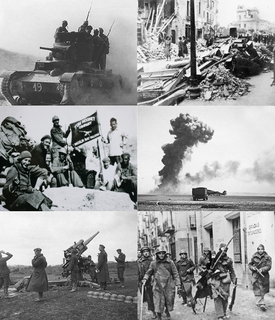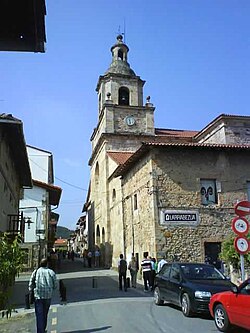
Colombia, officially the Republic of Colombia, is a country in South America. It is bounded on the north by the Caribbean Sea, the northwest by Panama, the south by Ecuador and Peru, the east by Venezuela, the southeast by Brazil, and the west by the Pacific Ocean. Colombia is composed of 32 departments and the Capital District of Bogotá, the country's largest city. It covers an area of 1,418,748 square kilometres (547,782 sq mi), with a population of 50 million. Colombia's rich cultural heritage reflects influences by various Amerindian civilizations, European settlement, forced African labor, and immigration from Europe and the Middle East. Spanish is the nation's official language, besides which over 70 languages are spoken.

Spain, formally the Kingdom of Spain, is a country in Southwestern Europe with some pockets of territory across the Strait of Gibraltar and the Atlantic Ocean. Its continental European territory is situated on the Iberian Peninsula and Its territory also includes two archipelagos: the Canary Islands off the coast of North Africa, and the Balearic Islands in the Mediterranean Sea. The African exclaves of Ceuta, Melilla, and Peñón de Vélez de la Gomera make Spain the only European country to have continental African territories. Several small islands in the Alboran Sea are also part of Spanish territory. The country's mainland is bordered to the south and east by the Mediterranean Sea; to the north and northeast by France, Andorra, and the Bay of Biscay; and to the west and northwest by Portugal and the Atlantic Ocean, respectively.

Spanish is a Romance language that originated in the Iberian Peninsula of Europe. Today, it is a global language with nearly 500 million native speakers, mainly in Spain and the Americas. It is the world's second-most spoken native language after Mandarin Chinese, and the world's fourth-most spoken language overall after English, Mandarin Chinese, and Hindi.

The Campeonato Nacional de Liga de Primera División, commonly known simply as Primera División in Spain, and as La Liga in English-speaking countries and officially as LaLiga Santander for sponsorship reasons, stylized as LaLiga, is the men's top professional football division of the Spanish football league system. Administered by the Liga Nacional de Fútbol Profesional, is contested by 20 teams, with the three lowest-placed teams at the end of each season relegated to the Segunda División and replaced by the top two teams and a play-off winner in that division.

The Spain national football team represents Spain in international men's football competitions since 1920. It is governed by the Royal Spanish Football Federation, the governing body for football in Spain. Spain are one of the eight national teams to have been crowned world champions, having participated in a total of 15 of 21 FIFA World Cups and qualifying consistently since 1978. Spain also won three continental titles, having appeared at 11 of 15 UEFA European Championships.

Luis Enrique Martínez García, known as Luis Enrique, is a Spanish professional football manager and former player. He is the current head coach of the Spain national team.

Erandio is a town and municipality located in the province of Biscay, in the autonomous community of Basque Country, northern Spain. The name comes from euskera ARANDIO that means plum plantation or field.

Galdakao is a town and municipality located in the province of Biscay, in the autonomous community of Basque Country, northern Spain.

Mexico, officially the United Mexican States, is a country in the southern portion of North America. It is bordered to the north by the United States; to the south and west by the Pacific Ocean; to the southeast by Guatemala, Belize, and the Caribbean Sea; and to the east by the Gulf of Mexico. Mexico covers 1,972,550 square kilometers (761,610 sq mi), making it the world's 13th-largest country by area; with approximately 126,014,024 inhabitants, it is the 10th-most-populous country and has the most Spanish-speakers. Mexico is organized as a federation comprising 31 states and Mexico City, its capital and largest metropolis. Other major urban areas include Guadalajara, Monterrey, Puebla, Toluca, Tijuana, Ciudad Juárez, and León.

Txorierri is a valley of Biscay, Basque Country, separated from Bilbao by low mountains Monte Artxanda and Monte Abril. It includes the municipalities of Erandio, Loiu, Sondika, Derio, Zamudio, Lezama and Larrabetzu. It holds the international airport of Bilbao. It includes industrial and residential areas.
Jesus Loroño Artega was a Spanish professional road racing cyclist during the 1950s and early 1960s. Loroño is most famous for capturing the 1957 Vuelta a España. The previous year at the Vuelta, he finished second to Angelo Conterno by just 13 seconds.

The Spanish Civil War was a civil war in Spain fought from 1936 to 1939. Republicans loyal to the left-leaning Popular Front government of the Second Spanish Republic, in alliance with anarchists, of the communist and syndicalist variety, fought against an insurrection by the Nationalists, an alliance of Falangists, monarchists, conservatives and traditionalists, led by a military group among whom General Francisco Franco soon achieved a preponderant role. Due to the international political climate at the time, the war had many facets and was variously viewed as class struggle, a religious struggle, a struggle between dictatorship and republican democracy, between revolution and counterrevolution, and between fascism and communism. According to Claude Bowers, U.S. ambassador to Spain during the war, it was the "dress rehearsal" for World War II. The Nationalists won the war, which ended in early 1939, and ruled Spain until Franco's death in November 1975.

Argentina, officially the Argentine Republic, is a country in the southern half of South America. It shares the bulk of the Southern Cone with Chile to the west, and is also bordered by Bolivia and Paraguay to the north, Brazil to the northeast, Uruguay and the South Atlantic Ocean to the east, and the Drake Passage to the south. Argentina covers an area of 2,780,400 km2 (1,073,500 sq mi), and is the largest Spanish-speaking nation in the world. It is the second-largest country in South America after Brazil, the fourth-largest country in the Americas, and the eighth-largest country in the world. Argentina is subdivided into twenty-three provinces, and one autonomous city, which is the federal capital and largest city of the nation, Buenos Aires. The provinces and the capital have their own constitutions, but exist under a federal system. Argentina claims sovereignty over a part of Antarctica, the Falkland Islands and South Georgia and the South Sandwich Islands.

The Lordship of Biscay was a region under feudal rule in the region of Biscay in the Iberian Peninsula between c.1040 and 1876, ruled by a political figure known as the Lord of Biscay. One of the Basque señoríos, it was a territory with its own political organization, with its own naval ensign, consulate in Bruges and customs offices in Balmaseda and Urduña, from the 11th Century until 1876, when the Juntas Generales were abolished. Since 1379, when John I of Castile became the Lord of Biscay, the lordship got integrated into the Crown of Castile, and eventually the Kingdom of Spain.

Zazpikaleak/Casco Viejo is a railway station in Bilbao, Basque Country (Spain). It is located in the historical neighbourhood of Casco Viejo, in the district of Ibaiondo. It connects the rapid transit network of Metro Bilbao with the commuter rail services of Euskotren Trena. It is the main hub of railway connection between the metropolitan underground network and the railway services to Eibar, Gernika, Bermeo and San Sebastián as well as the Txorierri valley. In its current form, the station opened on 8 April 2017.

The Bilbao Metropolitan Area is the metropolitan area or continuous urban area based around the city of Bilbao, in the Basque Country, Spain. It comprises the city of Bilbao, the 25 municipalities that make the comarca of Greater Bilbao plus ten other surrounding municipalities, all of them in the province of Biscay.

Hedoi Etxarte is a Basque violinist and translator.

The Bilbao-Concordia railway station, also known as La Concordia Station, and formerly and colloqually known as Santander Station, is a terminal railway station in Bilbao, Basque Country (Spain). The station was opened in 1902 and currently serves as the terminus station for several narrow-gauge regional and metropolitan railway services operated by Renfe Feve, a division of the state-owned Spanish railway company Renfe. The Bilbao-Abando railway station, also operated by Renfe and that offers medium and long distance services is located in close proximity.
Eneko Atxa Azurmendi is a Spanish Basque cuisine chef who seeks to “cook a better future." A five-star Michelin restaurant owner, Azurmendi was initially trained by his mother and grandmother and thereafter with Martin Berasategui. Keeping it in the family he opened his restaurant with his uncle Gorka Izaguirre.






















